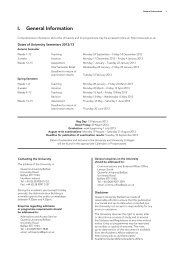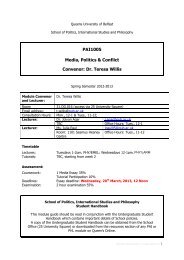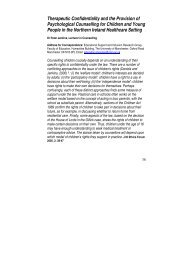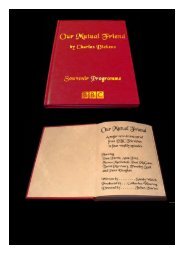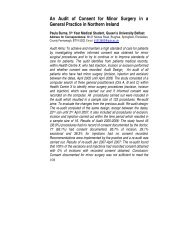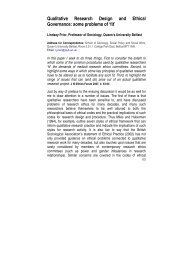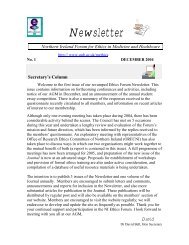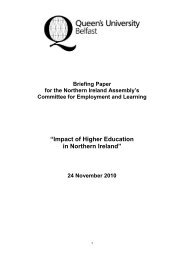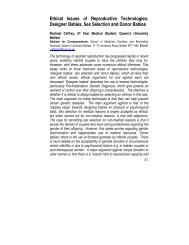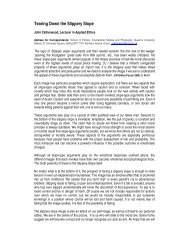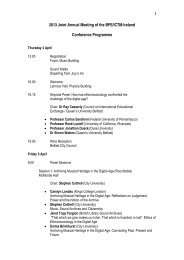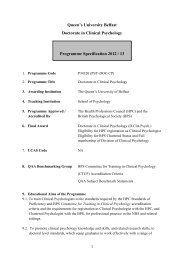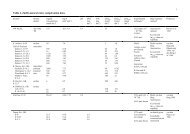MA Handbook 2011-12 (1) - Queen's University Belfast
MA Handbook 2011-12 (1) - Queen's University Belfast
MA Handbook 2011-12 (1) - Queen's University Belfast
Create successful ePaper yourself
Turn your PDF publications into a flip-book with our unique Google optimized e-Paper software.
The dissertation <br />
The following notes apply to all <strong>MA</strong> students excepting Creative Writing students. <br />
Students who have attained a pass mark (50%) for the taught modules may proceed to a <br />
dissertation, which constitutes the last two modules of the <strong>MA</strong> programme, researched during the <br />
summer months of the <strong>MA</strong> year. <br />
Deadline: Friday, 14 th September, 20<strong>12</strong> <br />
Word count: 15,000 words (inclusive of bibliography and notes) <br />
How you should prepare for the dissertation <br />
The <strong>MA</strong> dissertation is an independent research project, which offers you an exciting opportunity to <br />
choose what to study and write about in a dissertation which accounts for a third of the <strong>MA</strong> award. <br />
You are not entirely on your own, of course. You will be assigned a supervisor who will advise you <br />
about the scope of your topic, the organisation of your material, the list of books and articles you <br />
should consult, and who will read drafts of your dissertation prior to submission. The dissertation <br />
should test your skills in working independently on a research project, and the supervisor is there <br />
simply to advise on the direction of your studies. You are ultimately responsible for ensuring that <br />
your dissertation meets the required standards for submission, and for acting on the advice given to <br />
you by your supervisor. You will have a set number of meetings with your supervisor. Three or four <br />
meetings are common. The first will be an opportunity to discuss what topic you wish to research, <br />
the viability and scope of your research topic, and what problems you might anticipate in completing <br />
it. The last meeting will be a chance to review the draft which you will have submitted to your <br />
supervisor prior to the formal submission. Try to use the time with your supervisor wisely. Prepare in <br />
advance for the meeting, making a list of all the questions or problems you wish to discuss. <br />
Supervision takes place over the summer months when academics are frequently attending <br />
conferences, working on or writing up research and, at some point, taking some summer leave. In <br />
the first meeting with your supervisor you will agree a schedule for submitting draft chapters which <br />
can take these factors into consideration. <br />
Choice of topic: Scope and methodology, topics and approaches: these factors can vary widely. Past <br />
<strong>MA</strong> dissertations submitted as part of your <strong>MA</strong> programme give some indication of the potential <br />
variety. If you are uncertain how to shape your interests into a coherent, realistic dissertation topic, <br />
you should make contact with a relevant member of staff, who will be happy to advise. <br />
Supervisor: Usually a member of staff on the teaching team of your specific <strong>MA</strong> programme, and <br />
someone whose own research interests intersect to some degree with the topic of your dissertation. <br />
Meetings or correspondence with your supervisor will take place June-‐August, by arrangement on an <br />
individual basis. <br />
Format and layout (those in square brackets are optional): <br />
Title-‐page <br />
[Acknowledgements] <br />
Table of contents (keyed to page numbers at beginning of each chapter) <br />
Introduction <br />
Chapters (usually 3 or 4) <br />
Conclusion <br />
Bibliography <br />
[Appendices] <br />
21



